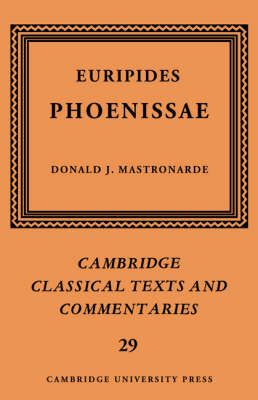Cambridge Classical Texts and Commentaries
2 total works
This volume provides a thorough philological and dramatic commentary on Euripides' Phoenissae, the first detailed commentary in English since 1911. Phoenissae is of special interest both as a specimen of late Euripidean dramaturgy, and as the subject of longstanding disputes over the extent of interpolation and rewriting to be detected in it. This commentary aims to offer a balanced treatment of issues of language, style, structure, and dramatic technique as well as to explain the reasons for and uncertainties of the constitution of the text. The introduction treats the play's structure and themes, the possible date, the features of the original production, the varied background of Theban myth against which Euripides' choices and innovations may be judged, and general issues relevant to the problem of interpolation. The Greek text is that of the author's 1988 Teubner edition.
The surviving text of the fragmentary Phaethon of Euripides depends chiefly on two sources: two pages from a Euripidean manuscript, written about A.D. 500, and a papyrus of the third century B.C., which contains a substantial part of the parodos. These sources are supplemented by a number of citations in classical authors and by a recently published fragmentary hypothesis. Professor Diggle has examined all the manuscript evidence and offers many decipherments. He gives a text of the play and of the hypothesis, an exegetical commentary, prolegomena and appendices, in which he discusses the treatment of the Phaethon myth in classical literature and attempts a reconstruction of the plot of the play.

